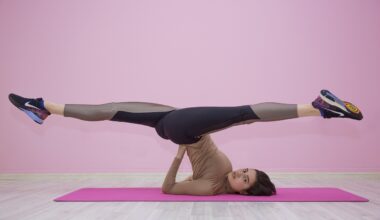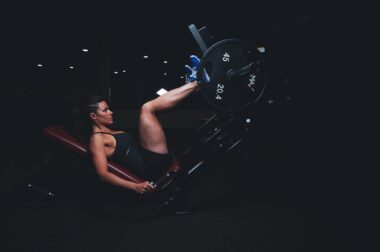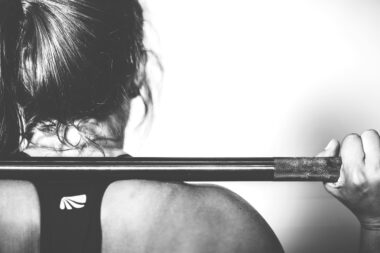How Sleep Affects Your Performance in HIIT Workouts
High-Intensity Interval Training (HIIT) workouts demand a robust physical and mental condition. The effectiveness of HIIT sessions relies heavily on various factors, with sleep being one of the most crucial. Sleep is a fundamental component of recovery and overall performance, significantly impacting how well individuals can perform during intense training. When individuals do not get sufficient sleep, it can lead to fatigue and decreased alertness, both of which can be detrimental during HIIT sessions. Moreover, the hormone balance in the body depends on a good night’s rest, affecting metabolism and muscle recovery. Poor sleep can adversely affect cognitive function, making it harder to maintain proper form and intensity during workouts. Consequently, inadequate sleep can reduce the efficacy of training, leading to a lower calorie burn and fewer overall fitness gains. It’s essential to prioritize sleep as part of a comprehensive fitness regimen that includes proper nutrition and hydration. Giving attention to sleep hygiene, including creating a conducive sleeping environment and establishing a regular sleep schedule, is vital for optimal HIIT performance.
The Science Behind Sleep and Fitness
Understanding how sleep influences HIIT performance involves delving into several scientific aspects of sleep patterns. Primarily, sleep consists of different stages—specifically REM and non-REM sleep, each contributing uniquely to recovery. Non-REM sleep assists in tissue growth, muscle repair, and improving energy levels. Meanwhile, REM sleep is critical for cognitive functions, emotional stability, and learning adaptation. Thus, a balanced sleep across these stages can enhance athletic performance significantly. Studies indicate that athletes who sleep less than the recommended seven to eight hours experience reduced muscular strength and endurance. Besides physical dimensions, cognitive performance—like reaction time and decision-making—can also suffer from lack of sleep. Engaging in HIIT workouts when sleep-deprived may lead to decreased stamina and a higher risk of injury. For individuals relying on HIIT for weight loss, poor sleep can disrupt the hormonal balance that regulates appetite and metabolism. The overall conclusion is that sleep should not be overlooked in training plans, but rather treated as a pillar of effective performance alongside exercise and nutrition.
Nutrition and hydration can further influence how sleep affects your HIIT workouts. If you eat a balanced diet combined with adequate hydration, your body can recover from workouts more effectively. Nutrients like proteins and carbohydrates play vital roles in muscle recovery, while staying hydrated improves circulation of blood and oxygen, essential for optimal energy levels. However, timing is important; consuming heavy meals too close to bedtime can disrupt sleep quality. Instead, focus on a light snack containing treat-worthy carbohydrates and proteins before heading to bed. Doing so can aid recovery without compromising sleep. Moreover, staying hydrated throughout the day can improve overall sleep quality. Sufficient hydration levels help avoid feelings of fatigue upon waking. A dehydrated body can lead to poor concentration and focus during HIIT routines, which can negatively influence performance. Therefore, maintaining a well-balanced diet, coupled with adequate water intake, is crucial for maximizing the benefits of sleep on HIIT workouts. In short, pairing effective nutrition with a good sleep schedule creates a solid framework for enhancing athletic ability.
Sleep Deprivation: Consequences for HIIT
Chronic sleep deprivation can lead to various detrimental outcomes, degrading performance during HIIT workouts significantly. One of the most immediate effects of lack of sleep is fatigue, which sets in faster when engaging in intense physical activity. As the heart rate increases during HIIT, the body struggles to keep up, leading to early exhaustion and a reduced ability to sustain effort throughout the session. Beyond fatigue, sleep deprivation also impairs the body’s natural recovery process following strenuous exercise, prompting unnecessary muscle soreness and prolonging recovery time. Hormonal imbalances that arise from inadequate sleep can lead to increased levels of cortisol, the body’s stress hormone. Elevated cortisol levels can hinder muscle growth and fat loss. Additionally, focus and mental sharpness decline, resulting in slower reaction times and a higher likelihood of injury. Consequently, consistency becomes harder to achieve, as both physical and mental barriers accumulate. Thus, neglecting sleep not only damages fitness progress but also undermines one’s motivation to sustain a regular HIIT routine. It is crucial to recognize these impacts and prioritize a healthy sleep regimen.
Interestingly, there are actionable steps that can help improve sleep quality for enhanced performance in HIIT workouts. One crucial step is to establish a consistent nightly routine that signals to the body when it’s time to wind down. Creating a relaxing pre-sleep environment devoid of screens can significantly heighten sleep quality; blue light emitted from devices can confuse circadian rhythms. Additionally, incorporating relaxation techniques such as deep breathing or short meditation sessions before bed can enhance focus and aid in winding down. Furthermore, exploring natural sleep aids like magnesium or melatonin can assist those struggling with insomnia. Sometimes, even exercising can positively influence sleep quality if done earlier in the day—allowing the body time to recover before bedtime. Regular training aids in the body’s overall adaptive processes and can prime our bodies for low-stress, restorative sleep cycles. On the flip side, avoid high-intensity workouts too close to bedtime, as this can elevate heart rates and interfere with falling asleep. Taking proactive measures toward better sleep not only enhances performance but also optimizes recovery and wellness.
Tracking Sleep Patterns for Better HIIT Performance
To truly grasp and optimize sleep’s impact on HIIT workouts, individuals can employ various tracking methods. Sleep tracking apps and wearable devices provide valuable insights into personal sleep patterns. These technologies help in assessing the duration and quality of sleep, highlighting potential areas that may need adjustment. Individuals can analyze factors like heart rate, breathing patterns throughout the night, and restful versus restless periods. Keeping a sleep diary can reinforce professionalism in guiding how habits like caffeine consumption or daily stressors affect sleep. By noting any fluctuations in workout performance correlating with sleep variations, individuals can identify what works and what does not. Additionally, consulting experts in sleep medicine can uncover hidden issues impacting sleep quality. Once clear data is gathered, effective changes can be administered to improve sleep related to HIIT output. Whether this involves addressing underlying sleep disorders or simply developing better nightly routines, the overall goal remains consistent: to harness the full benefits of sleep to optimize HIIT workout performance. Tiny adjustments in sleep habits can lead to significant gains in athletic prowess.
In conclusion, the influence of sleep on performance in HIIT workouts cannot be overstated. Quality sleep plays a significant role in recovery, muscle repair, and overall athletic performance. Understanding the stages of sleep allows individuals to make informed decisions on their sleep hygiene practices. Not only does adequate sleep improve physical capability, but it also enhances mental acuity — both essential for success in high-intensity training. Additionally, nutrition and hydration work hand in hand with sleep to create a well-rounded athletic regimen. By also monitoring sleep patterns, individuals can better tailor their routines for optimal performance, ensuring that fatigue does not hinder their HIIT workouts. Sound sleep leads to improved motivation, clearer thinking, and ultimately, better results. Consequently, for those committed to enhancing their workout efficiency and results, embracing proper sleep routines should become a priority. Having sufficient sleep aligns perfectly with maintaining motivation and enthusiasm for continuing a fitness journey. As such, it is vital to remove any obstacles to achieving high-quality sleep to maximize HIIT workout efficiency. Sleep well and perform exceptionally well in your workout journey.
Remember, without efficient sleep, achieving peak performance in HIIT workouts best becomes challenging. Implementing changes and addressing sleep-related issues can transform not only workout outcomes but overall lifestyles. Prioritize sleep for a happier and healthier training experience!





